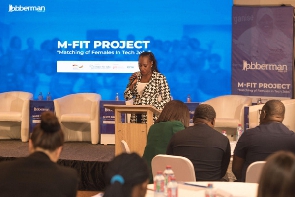 CEO of Jobberman Ghana, Hilda Nimo Tieku
CEO of Jobberman Ghana, Hilda Nimo Tieku
Jobberman Ghana has announced that by March 2024, the business seeks to place 60 young women with a STEM background in tech and tech-enabled jobs in Ghana.
According to the CEO of Jobberman Ghana, Hilda Nimo Tieku, the job placement forms part of the M-FIT Project which seeks to bridge the gender gap in the tech space, which is a collaboration with the Deutsche Gesellschaft für Internationale Zusammenarbeit (GIZ) GmbH on behalf of the German Federal Ministry for Economic Cooperation and Development (BMZ) within the framework of Invest for Jobs.
Speaking at the just-ended executive roundtable event dubbed; “Diversity and Inclusion; Empowering Young in Tech”, she explained: “ This project was purposely designed to empower and equip young women with Science, technology, engineering, and mathematics (STEM) backgrounds with essential soft skills, making them employable in the tech space.
Since the launch of the project, a total of 1840 applications were received from young women between the ages of 18 and 35 from across the country. 76.29% of these applicants have a first degree in various STEM fields, 17.64% with a Higher National Diploma, and 6.07% with a master's degree.
After 4 long weeks, 100 young women with a STEM background have completed the soft skills training program. This is a monumental step towards empowering and equipping these remarkable women with the skills and confidence they need to excel in their tech careers”.
Dana Krieger, Head of Component, Invest for jobs, GIZ Ghana, in her address, highlighted that it is a clear mandate of GIZ to support businesses in Ghana to create more jobs and better jobs, adding that the ICT and digital sector is one of the major sectors being focused on.
“Recognizing the private sector's vital role, Invest for Jobs collaborated with Jobberman Ghana to carry out the M-FIT project. The M-FIT project aligns seamlessly with Invest for Jobs's mission towards feministic development, by actively addressing the issue of inequality in the tech sector; thus contributing to a more inclusive and sustainable economy in general”, Dana stated.
Speaking on the theme; Diversity and Inclusion; Empowering Young in Tech, the keynote speaker for the executive roundtable, Ing. Dr. Lucy Agyepong, Vice President, of Institutional Advancement, Academic College University, and an advocate for STEM education, called on all stakeholders to embrace diversity and inclusion since it requires a collective effort of everyone in the society, pointing out that continuous education and change of mindset is the way to go.
“As a STEM education advocate, I believe that making STEM courses attractive in schools in the long run will give rewarding results. Parents must be educated on the rich prospects in the tech sector, educational institutions must make learning STEM courses attractive, and the government should consider awarding scholarships to young women interested in STEM courses to study up to a higher level”, Ing. Dr. Agyepong stated.
On her part, Dr. Mercy Gardiner O. Tenkorang, CEO, of Devapps Ltd, called on young women in Tech to be tenacious and not quit easily.
“Hard work pays. When you dream, dream as big as you can, work towards it, and you will surely get to that higher height. It’s always about making an impact.
In our quest to become relevant in the tech sector as women, you will surely face challenges, but whatever the case, I encourage you to be ready for the tough times when the times get tough, remember why you started, and how far you have come”, she concluded.
The Panel Discussion
The heart of the event was a riveting panel discussion, where luminaries from the tech industry shared insights, experiences, and strategies to foster a more inclusive tech landscape. The discussion explored challenges faced by young women in pursuing tech careers and highlighted the opportunities that exist for their empowerment.
Launch of Research Findings: Tackling Low Participation
A significant highlight of the event was the unveiling of research findings on the low participation of young women in tech. The research, a collaborative effort by Jobberman Ghana and its partners, shed light on the underlying challenges and catalyzed discussions on potential solutions.
The research revealed 4 unique challenges for female in STEM; which includes lack of mentorship, financial constraints, lack of opportunity, as well as gender stereotype.
